Why should Christians read evangelistic books?
5 minute read
Here at 10ofthose we love to encourage people to give away evangelistic books. It’s something we’re passionate about because we know that books that point to Jesus change lives.
Whether it's a short seasonal giveaway, a book of mini testimonies or a magazine or tract, we make sure we recommend resources which faithfully share the wonder of the gospel.
‘Great’, you may think, ‘I’ll grab a bunch and give them away… I trust your judgement!’
But when was the last time you read an evangelistic resource before passing it on? And is it absolutely necessary to do so?
Check out our top 5 reasons for reading evangelistic books before you pass them on!
1. We’re never done with the gospel.
Whether you were converted 5 minutes or 5 decades ago, the gospel is relevant and wonderful! Every time we reencounter the amazing grace extended to us we have an opportunity to give thanks for all that God has, and is, doing for us. Old truths in fresh and relevant form can enhance and complement our own relationship with God. Regularly being reminded of the gospel is good for our own walk with God and helping us to keep our eyes fixed on Jesus. (Hebrews 12 v 2)
"Reading evangelistic literature keeps me anchored to what I already believe. It helps me to re-believe the gospel every day. When Paul wrote his second letter to Timothy, he said to this young pastor "Remember Jesus Christ, risen from the dead, the offspring of David, as preached in my gospel" (2 Timothy 2:8). He wanted to make sure Timothy didn't forget Jesus or the gospel because he knew how prone we all are to forgetfulness. Reading evangelistic books as a Christian reminds me of the gospel. I need those reminders daily! I also find reading evangelistic materials helps make me more prepared, in a wider variety of settings, to present the essential good news of the death and resurrection of Jesus to those who are far from Jesus, and far from the church. " Bob Lepine, pastor, author and broadcaster.
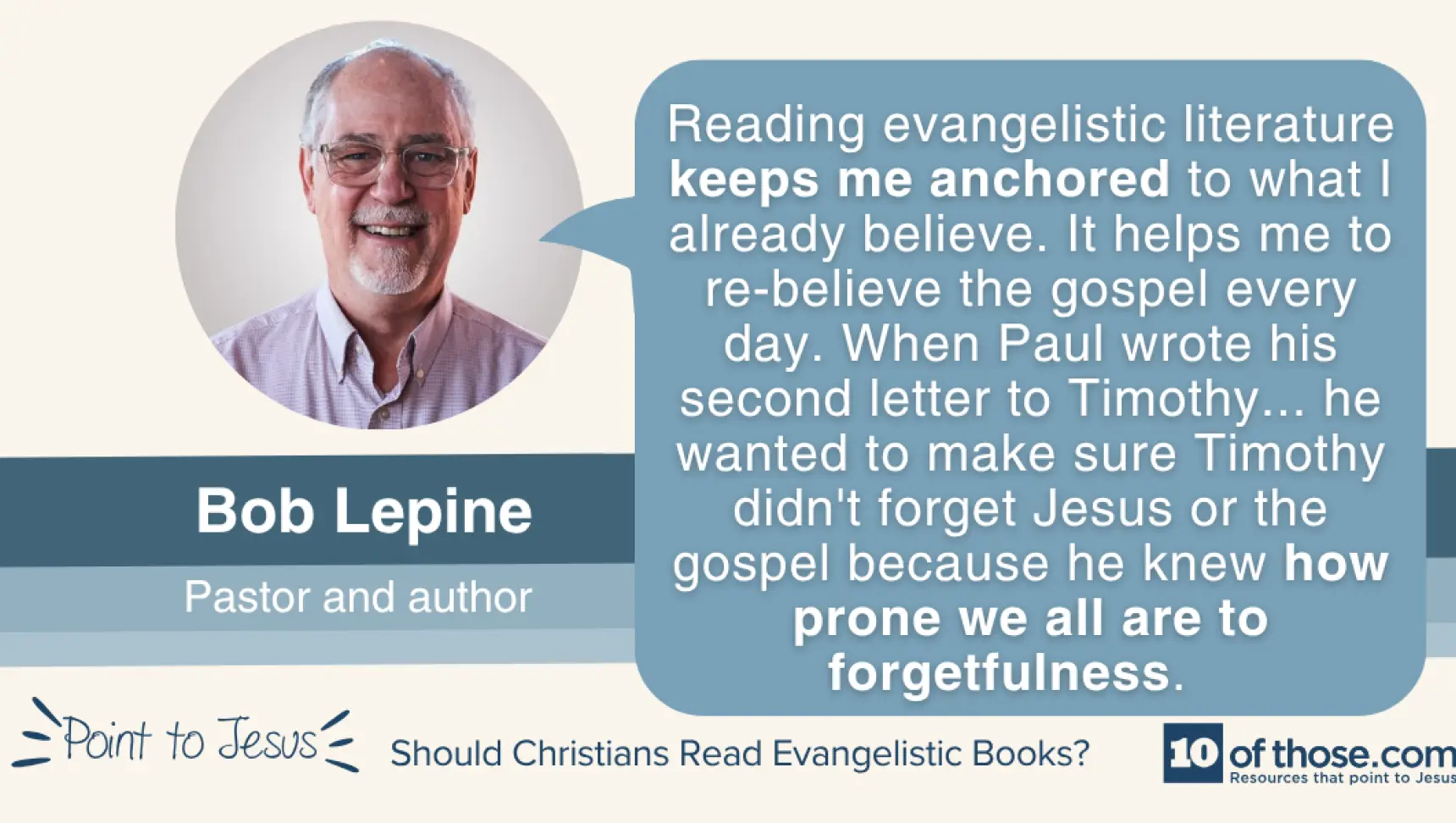
“Reading—and for me, writing—evangelistic resources (such as Tears and Tossings) serves not only the curious unbeliever, but the believer as well. It strips away the use of Christianeze, lofty language, and draws us back to the beautiful simplicity of the gospel in a fresh and personal way. It’s often been said, “If you want to understand profound truths in a clear and simple way, learn how to communicate those truths to children.” Similarly, if we want a fresh dose of child-like faith, evangelistic literature has a beautiful way of drawing us back to the very heart of God and the personal, life-changing presence of Jesus.” Sarah Walton, author of Tears and Tossings
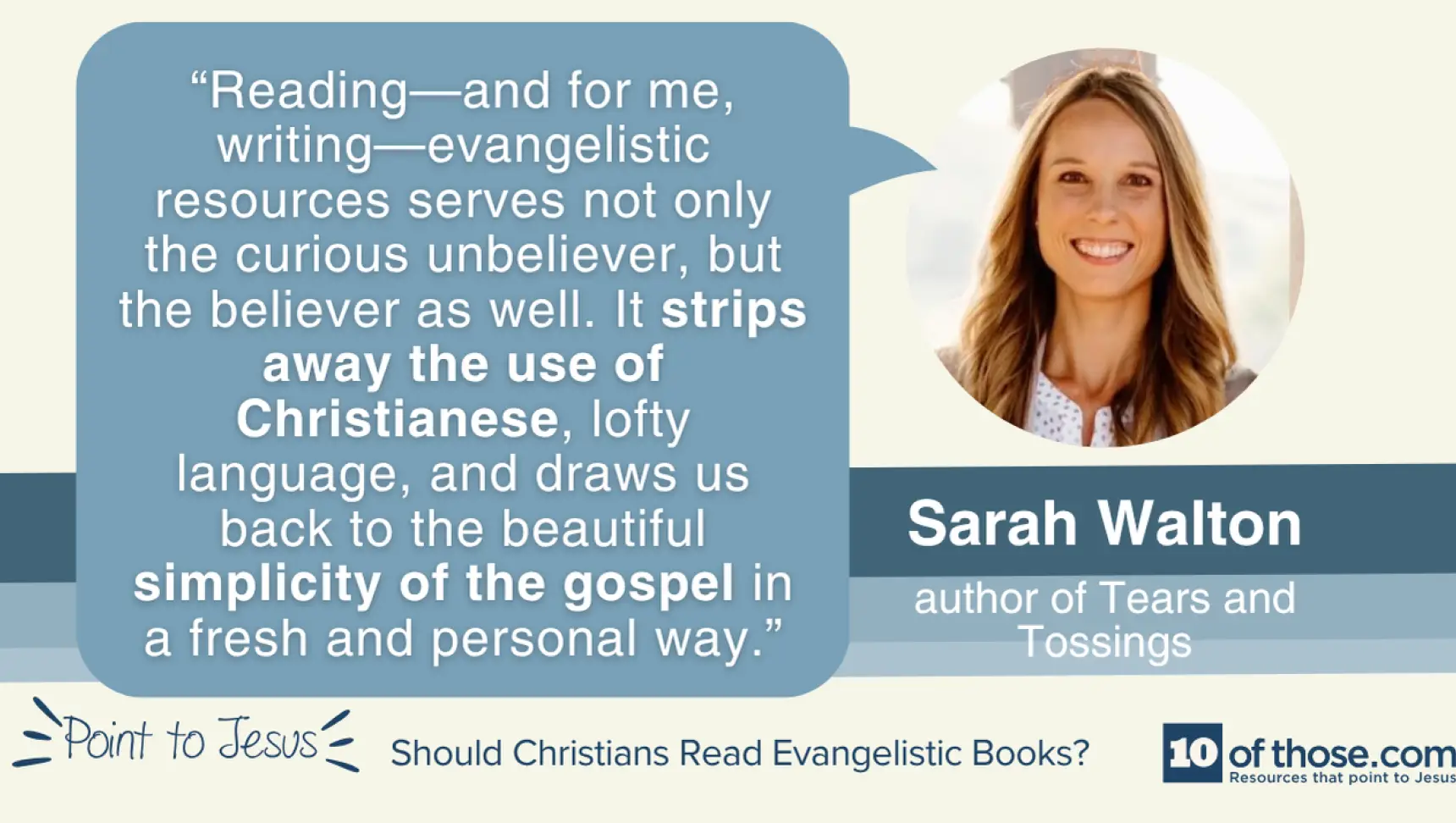
2. Test and approve what is good.
We hand pick our resources to ensure they hold true to the Bible's teaching, but we encourage everyone to be testing and discerning this for themselves. This is especially important when it is evangelistic material. Non-Christians, or those young in the faith, can be easily confused or led astray, and we should be in the habit of checking what we are pointing them to. Perhaps that seems a little daunting, but many evangelistic resources are short and can be read through in under an hour.
‘But solid food is for the mature, who by constant use have trained themselves to distinguish good from evil.’ (Hebrews 5 v 14)
3. Find what fits.
With many evangelistic books available it can be hard to know which one is the right fit. Giving a personal recommendation is a great way of handing out a book to a friend, family member or colleague. Of course we can look up reviews or Google to find something, but it’s unlikely we'll remember these in the long term. Once you’ve read a book (and written a review to help others!) you are much more likely to be able to recommend it.
“I had a text from a friend recently who had an opportunity at her daughter's school to speak to one of her daughter's teachers. She was able to have a conversation using some of the material of a book that I'd written about optimism and real Christian hope. The only reason she could have that conversation - which resulted in the teacher taking a copy of the evangelistic book - was because she knew what was in it first.”
Graham Albans, Director of Mission & Outreach at Grace Community Church, author of How One Weekend Can Give You Everything You Ever Wanted.
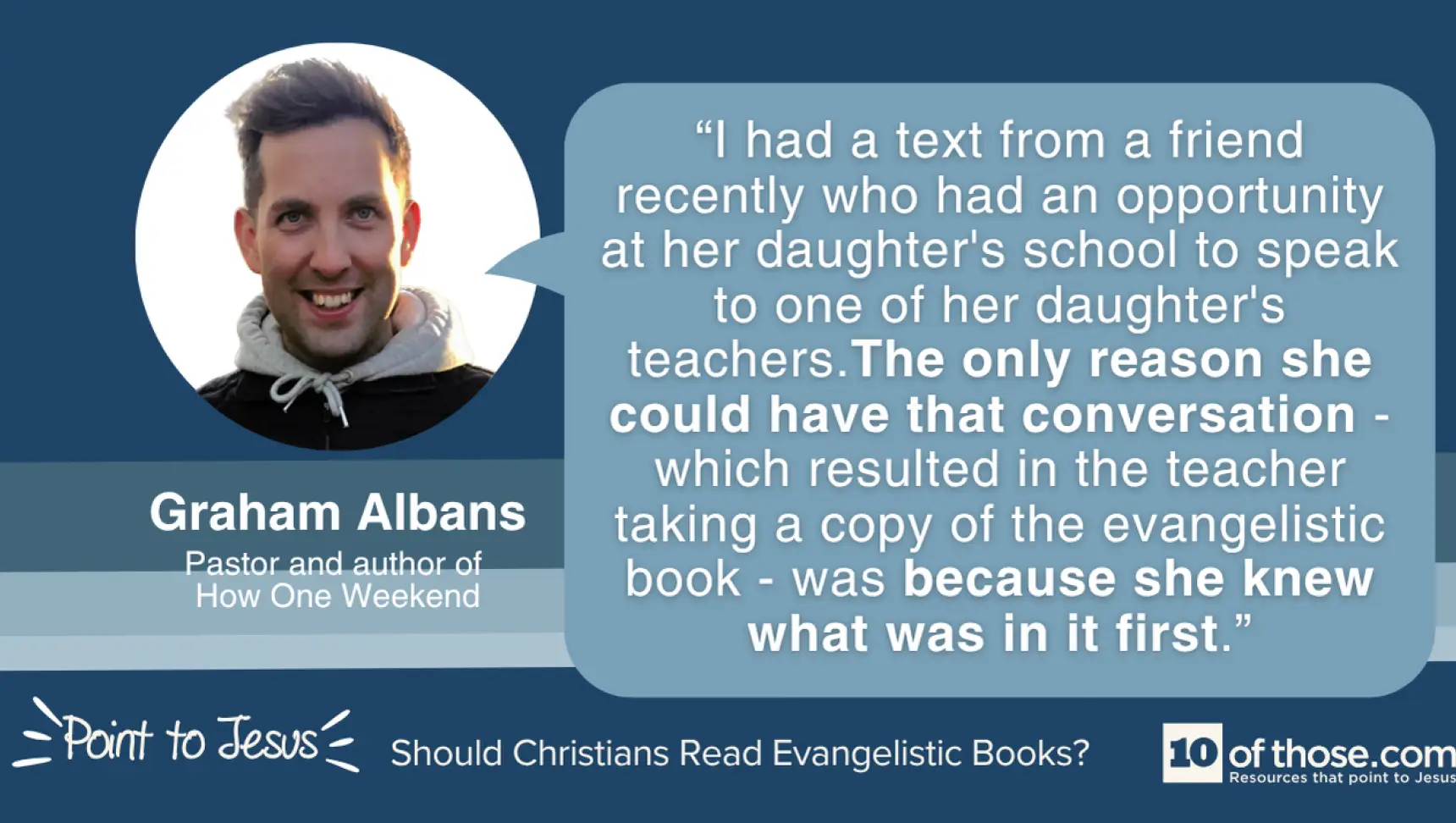
Listen to some more of Graham’s top reasons for reading evangelistic books.
4. Learn fresh gospel perspectives.
The gospel doesn’t change, but society does, and evangelistic books written with a modern reader in mind can open our eyes to new ways of interacting with unbelievers. They can provide us with phrases and illustrations we can use in our own evangelism.
“I love the gospel. It is such a joy to speak of the gospel to others. I use evangelistic tracts and books, and though I have written some myself, I always like to read those written by others. As well as the joy of knowing that the gospel is being spread, I see new insights, fresh expressions of familiar truths, pertinent illustrations, and precious reminders of who Jesus is, and all I owe to him. Read them yourself, and distribute them widely!”
Roger Carswell, evangelist and author of Grill a Christian
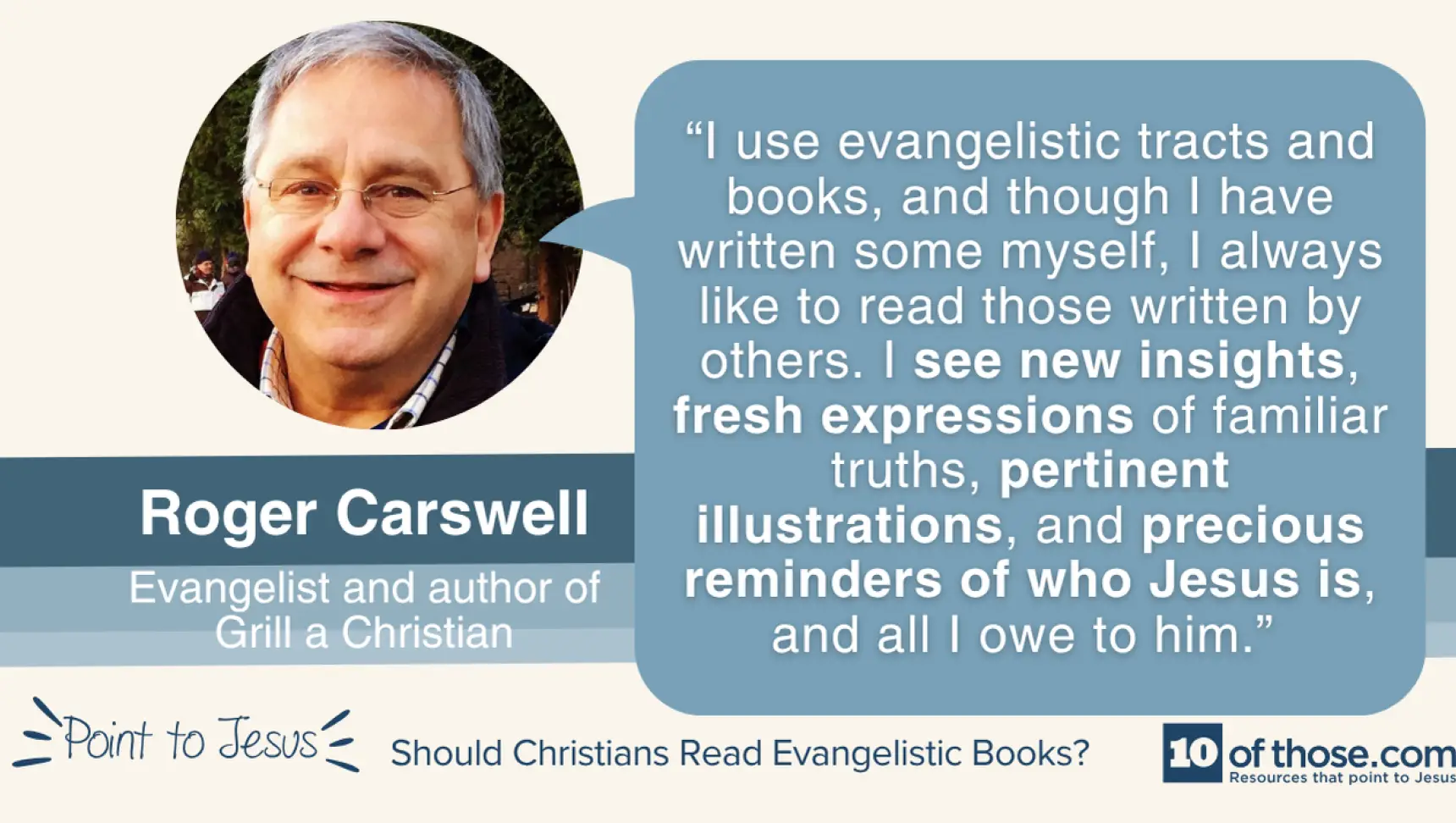
5. A crash course in apologetics.
Books like Things We All Have in Common, Have You Ever Wondered and The Truth About Lies are great examples of evangelistic books, written specifically to address the issues and concerns of non-Christians. Reading these can open our eyes to ways we can introduce Christ into our own conversations.
“Much as I love J.C. Ryle, I also love Glen Scrivener; a lively, contemporary writer who brings the gospel to bear on issues and trends that Ryle could never have imagined. The challenge to keep expressing the gospel in ways our peers can understand, and which confronts the sins and idols of today is great. Gifted evangelists are called to do exactly this, and in their evangelistic books share that with us.”
Gavin Matthews, Assistant Director of Solas, co-author of Have You Ever Wondered.
Read more from Gavin here.
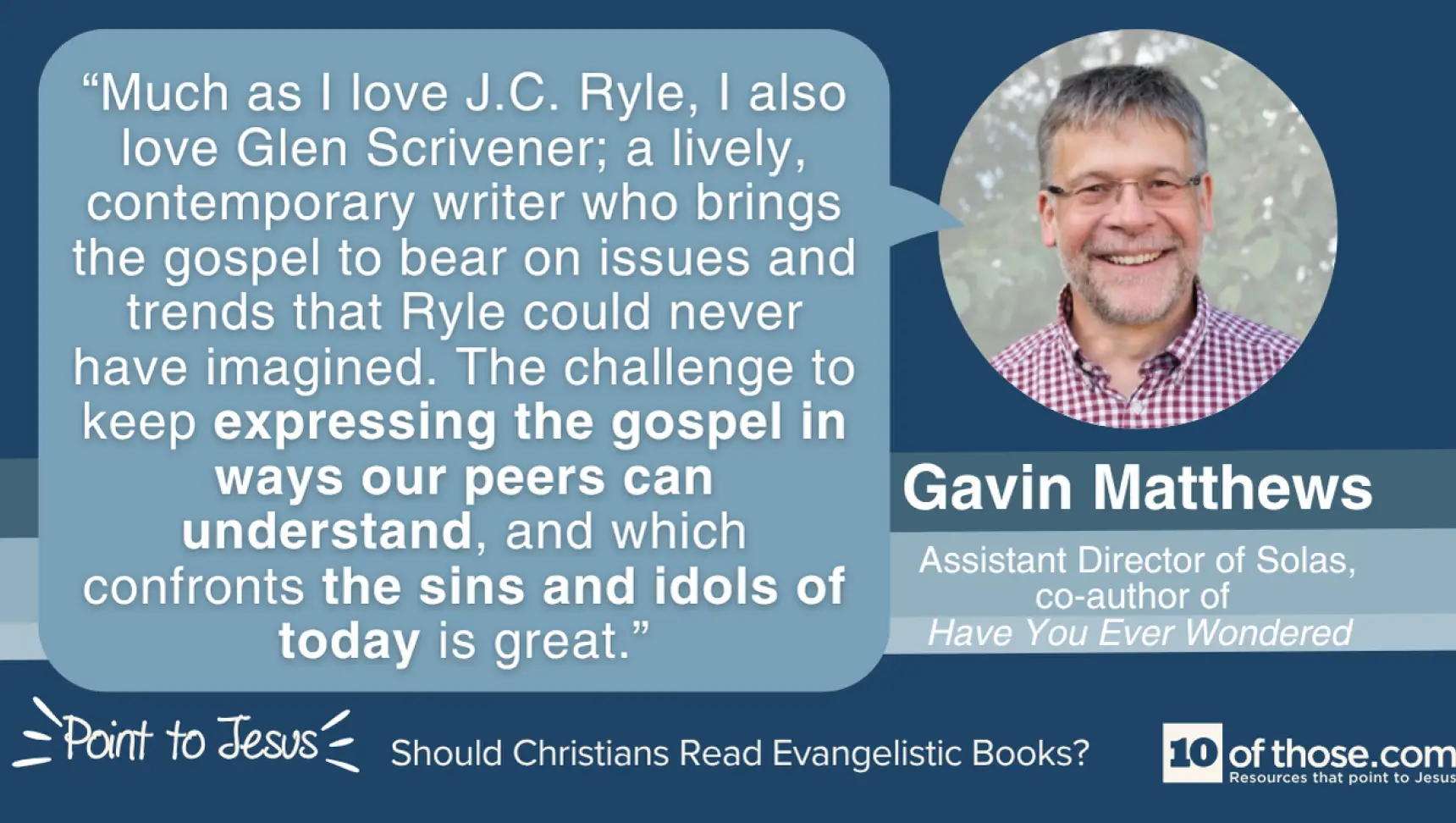
‘Always be prepared to give an answer to everyone who asks you to give the reason for the hope that you have.’ 1 Peter 3 v 15
Challenge
Could you make it your aim to read 1 or 2 evangelistic resources each month?
Whether a short tract, or a longer book, every opportunity we take to do so will remind us of the gospel, keep our eyes fixed on Jesus and prime our minds and hearts for gospel conversations.
Let us know your favourite evangelistic resource, and who it is suitable for here.
Your next read...
The Value of Physical Books - 15 reasons why they're awesome - 2 minute read
Gospel Hospitality - 5 minute read
Using tracts in Evangelism - 6 minute read
How we can share the gospel with our family? - 9 minute read